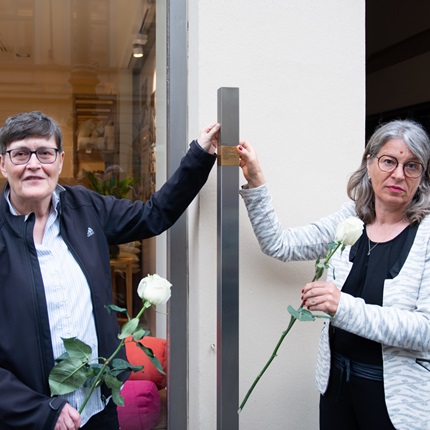Gustav Wiener was born in Regensburg on June 7, 1873, and, with his three older sisters, he spent his childhood and youth there. From 1872 he studied medicine, firstly in Munich and subsequently in Tübingen and Breslau (today Wrocław). After gaining his doctorate, Gustav Wiener became a junior doctor at the Königliche Universitäts-Frauenklinik (Royal University Women’s Clinic) in Munich. He wrote several articles for medical journals. Around 1903/4 he opened his own practice for women’s diseases at Maximilianstrasse 38. In 1912, Gustav Wiener married Babette Müller from Nuremberg, who was 13 years his junior. In June 1932 he moved with her to the second floor of Odeonsplatz 1. The practice was also accommodated there.
Just a few weeks after the Nazis’ seizure of power, Gustav and Babette Wiener were made to feel the hatred of the Nazis for Jews in a cruel way. SA men attacked them during the night of March 28 and 29, 1933 – a deliberate act of terror, for the thugs deliberately singled out the apartment of Gustav and Babette Wiener. As Babette Wiener reported in 1950, “Twelve SA men forced their way into the apartment, destroyed the telephone line, wrecked the apartment and forced their way into our bedroom, while other SA stood guard in front of the house. We were made to face each other completely naked, and I could see how my husband was bleeding from all sorts of wounds. All his teeth had been smashed in, both his shins had been broken and he was suffering from broken ribs.” Gustav Wiener was released a few hours later and taken to hospital. He did not recover from the abuse and died on November 25, 1993 after spending several months in hospital. His widow Babette moved to Hohenschäftlarn a short time later. Since she was not Jewish, she was not persecuted. She died on February 3, 1963. Because of the traumatic events she had a serious heart condition and constantly underwent medical treatment. Even after the war, the attack on her and her husband was never dealt with by the judicial system.(text Dr. Eva Strauß, editor C. Fritsche, translation C. Hales)




